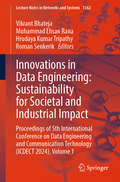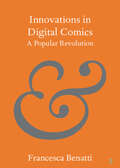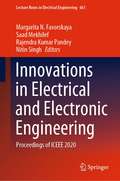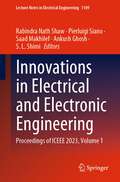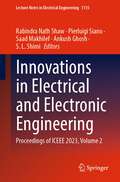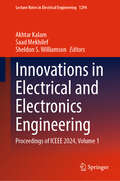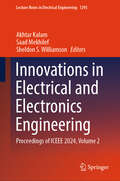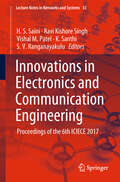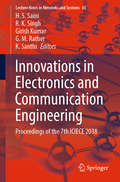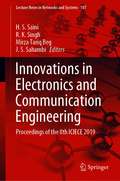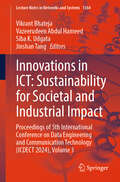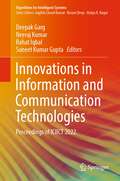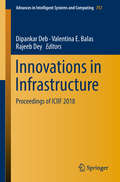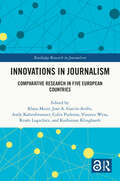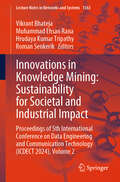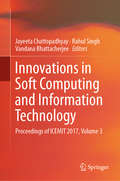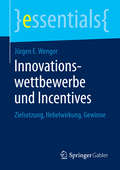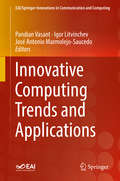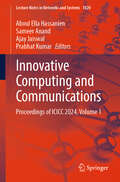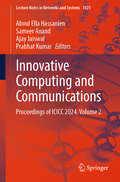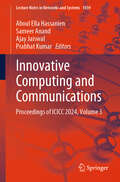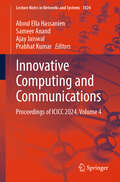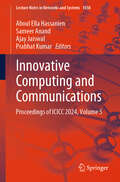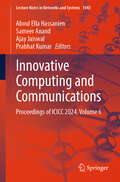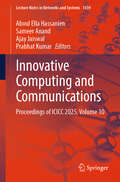- Table View
- List View
Innovations in Data Engineering: Proceedings of 5th International Conference on Data Engineering and Communication Technology (ICDECT 2024), Volume 1 (Lecture Notes in Networks and Systems #1362)
by Roman Senkerik Vikrant Bhateja Hrudaya Kumar Tripathy Muhammad Ehsan RanaThis book includes selected papers presented at the 5th International Conference on Data Engineering and Communication Technology (ICDECT 2024), held at Asia Pacific University of Technology and Innovation (APU, Kuala Lumpur, Malaysia, during 28–29 September 2024. It features advanced, multidisciplinary research towards the design of smart computing, information systems and electronic systems. It also focuses on various innovation paradigms in system knowledge, intelligence and sustainability which can be applied to provide viable solutions to diverse problems related to society, the environment and industry.
Innovations in Digital Comics: A Popular Revolution (Elements in Publishing and Book Culture)
by Francesca BenattiThe success of popular webcomics (comics produced and read entirely digitally) is the greatest revolution in the comics medium of the last two decades. Webcomics exploit a socio-technical convergence between digital platforms and participatory cultures, enabling global authors to work together with global audiences to transcend established print comics structures. After defining digital comics, webcomics and webtoons, this Element presents a case study of Korean platform WEBTOON, which achieved 100 billion global page views in 2019. The study analyses data from their website, including views, subscriptions and likes, to quantify and assess whether WEBTOON's commercial and critical success is connected to its inclusion of a wider range of genres and of a more diverse author base than mainstream English-language print comics. In so doing, it performs the first Book Historical study of webcomics and webtoons. This title is also available as Open Access on Cambridge Core.
Innovations in Electrical and Electronic Engineering: Proceedings of ICEEE 2020 (Lecture Notes in Electrical Engineering #661)
by Margarita N. Favorskaya Saad Mekhilef Rajendra Kumar Pandey Nitin SinghThe book is a compilation of selected papers from 2020 International Conference on Electrical and Electronics Engineering (ICEEE 2020) held in National Power Training Institute HQ (Govt. of India) on February 21 – 22, 2020. The work focuses on the current development in the fields of electrical and electronics engineering like power generation, transmission and distribution, renewable energy sources and technology, power electronics and applications, robotics, artificial intelligence and IoT, control, and automation and instrumentation, electronics devices, circuits and systems, wireless and optical communication, RF and microwaves, VLSI, and signal processing. The book is beneficial for readers from both academia and industry.
Innovations in Electrical and Electronic Engineering: Proceedings of ICEEE 2023, Volume 1 (Lecture Notes in Electrical Engineering #1109)
by Pierluigi Siano Ankush Ghosh Rabindra Nath Shaw S. L. Shimi Saad MakhilefThis book features selected high-quality papers presented at the 2023 International Conference on Electrical and Electronics Engineering (ICEEE 2023), organized at Chitkara University, Himachal Pradesh in August 2023. The book focuses on current development in the fields of electrical and electronics engineering. The book one covers electrical engineering topics–power and energy including renewable energy, power electronics and applications, control, and automation and instrumentation and book two covers the areas of robotics, artificial intelligence and IoT, electronics devices, circuits and systems, wireless and optical communication, RF and microwaves, VLSI, and signal processing and others. The book brings both single- and multidisciplinary research on these topics to provide the most up-to-date information in one place. The book offers an asset for researchers from both academia and industries involved in advanced studies.
Innovations in Electrical and Electronic Engineering: Proceedings of ICEEE 2023, Volume 2 (Lecture Notes in Electrical Engineering #1115)
by Pierluigi Siano Ankush Ghosh Rabindra Nath Shaw S. L. Shimi Saad MakhilefThis book features selected high-quality papers presented at the 2023 International Conference on Electrical and Electronics Engineering (ICEEE 2023), organized at Chitkara University, Himachal Pradesh in August 2023. The book focuses on current development in the fields of electrical and electronics engineering. The book one covers electrical engineering topics–power and energy including renewable energy, power electronics and applications, control, and automation and instrumentation and book two covers the areas of robotics, artificial intelligence and IoT, electronics devices, circuits and systems, wireless and optical communication, RF and microwaves, VLSI, and signal processing and others. The book brings both single- and multidisciplinary research on these topics to provide the most up-to-date information in one place. The book offers an asset for researchers from both academia and industries involved in advanced studies.
Innovations in Electrical and Electronics Engineering: Proceedings of ICEEE 2024, Volume 1 (Lecture Notes in Electrical Engineering #1294)
by Sheldon S. Williamson Akhtar Kalam Saad MekhilefThis book features selected high-quality papers presented at the 2024 International Conference on Electrical and Electronics Engineering (ICEEE 2024), jointly organized by ADSRS Education and Research and Swinburne University of Technology, Melbourne, Australia, during September 11–12, 2024, at Advanced Technologies Centre, Swinburne University of Technology, 427-451 Burwood Rd, Hawthorn VIC 3122. The book covers electrical engineering topics–power and energy including renewable energy, power electronics and applications, control, and automation and instrumentation, and book two covers the areas of robotics, artificial intelligence and IoT, electronics devices, circuits and systems, wireless and optical communication, RF and microwaves, VLSI, and signal processing, and others. The book brings both single- and multidisciplinary research on these topics to provide the most up-to-date information in one place. The book offers an asset for researchers from both academia and industries involved in advanced studies.
Innovations in Electrical and Electronics Engineering: Proceedings of ICEEE 2024, Volume 2 (Lecture Notes in Electrical Engineering #1295)
by Sheldon S. Williamson Akhtar Kalam Saad MekhilefThis book features selected high-quality papers presented at the 2024 International Conference on Electrical and Electronics Engineering (ICEEE 2024), Jointly organized by ADSRS Education and Research and Swinburne University of Technology, Melbourne, Australia during September 11-12, 2024, at Advanced Technologies Centre, Swinburne University of Technology, 427-451 Burwood Rd, Hawthorn VIC 3122. The book covers electrical engineering topics—power and energy including renewable energy, power electronics and applications, control, and automation and instrumentation and book two covers the areas of robotics, artificial intelligence and IoT, electronics devices, circuits and systems, wireless and optical communication, RF and microwaves, VLSI, signal processing, and others. The book brings both single- and multidisciplinary research on these topics to provide the most up-to-date information in one place. The book offers an asset for researchers from both academia and industries involved in advanced studies.
Innovations in Electronics and Communication Engineering: Proceedings Of The Fifth Iciece 2016 (Lecture Notes in Networks and Systems #7)
by Vishal M. Patel H. S. Saini Ravi Kishore Singh K. Santhi S. V. RanganayakuluThe book is a collection of best selected research papers presented at 6th International Conference on Innovations in Electronics and Communication Engineering at Guru Nanak Institutions Hyderabad, India. The book presents works from researchers, technocrats and experts about latest technologies in electronic and communication engineering. The book covers various streams of communication engineering like signal processing, VLSI design, embedded systems, wireless communications, and electronics and communications in general. The authors have discussed the latest cutting edge technology and the volume will serve as a reference for young researchers.
Innovations in Electronics and Communication Engineering: Proceedings of the 7th ICIECE 2018 (Lecture Notes in Networks and Systems #65)
by H. S. Saini R. K. Singh K. Santhi Girish Kumar G. M. RatherThis book gathers selected papers presented at the 7th International Conference on Innovations in Electronics and Communication Engineering, held at Guru Nanak Institutions in Hyderabad, India. It highlights contributions by researchers, technocrats and experts regarding the latest technologies in electronic and communication engineering, and addresses various aspects of communication engineering, including signal processing, VLSI design, embedded systems, wireless communications, and electronics and communications in general. Covering cutting-edge technologies, the book offers a valuable resource, especially for young researchers.
Innovations in Electronics and Communication Engineering: Proceedings of the 8th ICIECE 2019 (Lecture Notes in Networks and Systems #107)
by H. S. Saini R. K. Singh Mirza Tariq Beg J. S. SahambiThis book is a collection of the best research papers presented at the 8th International Conference on Innovations in Electronics and Communication Engineering at Guru Nanak Institutions Hyderabad, India. Featuring contributions by researchers, technocrats and experts, the book covers various areas of communication engineering, like signal processing, VLSI design, embedded systems, wireless communications, and electronics and communications in general, as well as cutting-edge technologies. As such, it is a valuable reference resource for young researchers.
Innovations in ICT: Proceedings of 5th International Conference on Data Engineering and Communication Technology (ICDECT 2024), Volume 3 (Lecture Notes in Networks and Systems #1364)
by Vikrant Bhateja Siba K. Udgata Jinshan Tang Vazeerudeen Abdul HameedThis book includes selected papers presented at the 5th International Conference on Data Engineering and Communication Technology (ICDECT 2024), held at Asia Pacific University of Technology and Innovation (APU, Kuala Lumpur, Malaysia, during 28–29 September 2024. It features advanced, multidisciplinary research towards the design of smart computing, information systems and electronic systems. It also focuses on various innovation paradigms in system knowledge, intelligence and sustainability which can be applied to provide viable solutions to diverse problems related to society, the environment and industry.
Innovations in Information and Communication Technologies: Proceedings of ICIICT 2022 (Algorithms for Intelligent Systems)
by Neeraj Kumar Deepak Garg Suneet Kumar Gupta Rahat IqbalThis book gathers selected papers presented at the International Conference on Innovations in Information and Communication Technologies (ICIICT 2022), held in Thailand during April 15–16, 2022. It presents the works on the intersection of the Computer Science and Communication Engineering. Topics covered in the book include communications engineering, Internet and web technology, computer and information science, artificial intelligence, data science and management, and ICT applications.
Innovations in Infrastructure: Proceedings of ICIIF 2018 (Advances in Intelligent Systems and Computing #757)
by Rajeeb Dey Valentina E. Balas Dipankar DebThe book covers innovative research and its applications in infrastructure development and related areas. This book discusses the state-of-art development, challenges and unsolved problems in the field of infrastructure/smart development, control engineering, power system infrastructure, smart infrastructure, waste management and renewable energy. The solutions discussed in this book encourage the researchers and IT professionals to put the methods into their practice.
Innovations in Journalism: Comparative Research in Five European Countries (Routledge Research in Journalism)
by Klaus Meier Vinzenz Wyss Jose A. García-Avilés Andy Kaltenbrunner Colin Porlezza Renée Lugschitz Korbinian KlinghardtThis volume explores innovations in journalism: the goals and expectations associated with them, promoting and hindering framework conditions, and their social and industrial impact.Drawing on an international research project conducted in Germany, Austria, Switzerland, Spain, and the United Kingdom, the book takes a complex approach, considering media policy preconditions and the social impact of journalistic innovation from a comparative perspective. The key findings are examined and presented on different levels: theoretical, methodological, and – as the focus – empirical.Having identified the most relevant innovations in each of the five countries, a total of 100 case studies are examined to explore the influence of these innovations on the quality of journalism and its normative role in democratic societies and to analyze which preconditions support or inhibit the development and implementation of the innovations in news organizations. The interdependencies between journalistic innovations and their media policy preconditions are compared in a system-analytical way – concluding with the lessons that can be learned from the macrolevel (policies) and the mesolevel (organizations).This insightful and truly international volume will interest professionals, scholars and students of journalism, media and communication studies, media industry studies, and related fields.
Innovations in Knowledge Mining: Proceedings of 5th International Conference on Data Engineering and Communication Technology (ICDECT 2024), Volume 2 (Lecture Notes in Networks and Systems #1363)
by Roman Senkerik Vikrant Bhateja Hrudaya Kumar Tripathy Muhammad Ehsan RanaThis book includes selected papers presented at the 5th International Conference on Data Engineering and Communication Technology (ICDECT 2024), held at Asia Pacific University of Technology and Innovation (APU, Kuala Lumpur, Malaysia, during 28–29 September 2024. It features advanced, multidisciplinary research towards the design of smart computing, information systems and electronic systems. It also focuses on various innovation paradigms in system knowledge, intelligence and sustainability which can be applied to provide viable solutions to diverse problems related to society, the environment and industry.
Innovations in Soft Computing and Information Technology: Proceedings of ICEMIT 2017, Volume 3
by Rahul Singh Jayeeta Chattopadhyay Vandana BhattacherjeeThe book presents innovative scientific research works by academics, research scholars and students, presented at the 2017 International Conference on Energy, Materials and Information Technology at Amity University Jharkhand, India. It includes contributions on system solutions based on soft computing techniques, and covers innovative soft computing techniques and tools with advanced applications. A major focus of the book is on presenting interdisciplinary problems and how they can be solved using information technology, together with innovative connections to other disciplines. It also includes papers on cloud computing and WSN-related real-time research.
Innovationswettbewerbe und Incentives: Zielsetzung, Hebelwirkung, Gewinne (essentials)
by Jürgen E. WengerDie Anzahl der Innovationswettbewerbe und deren weltweite Bedeutung nahmen in den letzten Jahren immer weiter zu. Insbesondere die Gewinne von Innovationswettbewerben sind mannigfaltig und von steigendem Wert. Viele kreative und engagierte Menschen in der ganzen Welt, aus allen Altersgruppen und Gesellschaftsschichten, nehmen an Innovationswettbewerben teil. Die Zielsetzung eines solchen Wettbewerbs kann sehr unterschiedlich sein. Auf Basis dieser verschiedenen Zielsetzungen werden sieben Grundtypen von Innovationswettbewerben hergeleitet. Dabei spielt die Gestaltung der Gewinne eine wichtige Rolle, denn diese bietet eine Möglichkeit zur Beeinflussung der Teilnahmebereitschaft, der Leistungsbereitschaft der Teilnehmer und der allgemeinen Attraktivität eines Innovationswettbewerbes.
Innovative Computing Trends and Applications (EAI/Springer Innovations in Communication and Computing)
by Pandian Vasant Igor Litvinchev José Antonio Marmolejo-SaucedoThis book provides a survey on research, development, and trends in innovative computing in communications engineering and computer science. It features selected and expanded papers from the EAI International Conference on Computer Science and Engineering 2018 (COMPSE 2018), with contributions by top global researchers and practitioners in the field. The content is of relevance to computer science graduates, researchers and academicians in computer science and engineering. The authors discuss new technologies in computer science and engineering that have reduced the dimension of data coverage worldwide, reducing the gaps and coverage of domains globally. They discuss how these advances have also contributed to strength in prediction, analysis, and decision in the areas such as Technology, Management, Social Computing, Green Computing, and Telecom. Contributions show how nurturing the research in technology and computing is essential to finding the right pattern in the ocean of data.Focuses on research areas of innovative computing and its application in engineering and technology;Includes contributions from researchers in computing and engineering from around the world;Features selected and expanded papers from EAI International Conference on Computer Science and Engineering 2018 (COMPSE 2018).
Innovative Computing and Communications: Proceedings of ICICC 2024, Volume 1 (Lecture Notes in Networks and Systems #1020)
by Aboul Ella Hassanien Sameer Anand Ajay Jaiswal Prabhat KumarThis book includes high-quality research papers presented at the Seventh International Conference on Innovative Computing and Communication (ICICC 2024), which is held at the Shaheed Sukhdev College of Business Studies, University of Delhi, Delhi, India, on 16–17 February 2024. Introducing the innovative works of scientists, professors, research scholars, students, and industrial experts in the field of computing and communication, the book promotes the transformation of fundamental research into institutional and industrialized research and the conversion of applied exploration into real-time applications.
Innovative Computing and Communications: Proceedings of ICICC 2024, Volume 2 (Lecture Notes in Networks and Systems #1021)
by Aboul Ella Hassanien Sameer Anand Ajay Jaiswal Prabhat KumarThis book includes high-quality research papers presented at the Seventh International Conference on Innovative Computing and Communication (ICICC 2024), which is held at the Shaheed Sukhdev College of Business Studies, University of Delhi, Delhi, India, on 16–17 February 2024. Introducing the innovative works of scientists, professors, research scholars, students, and industrial experts in the field of computing and communication, the book promotes the transformation of fundamental research into institutional and industrialized research and the conversion of applied exploration into real-time applications.
Innovative Computing and Communications: Proceedings of ICICC 2024, Volume 3 (Lecture Notes in Networks and Systems #1039)
by Aboul Ella Hassanien Sameer Anand Ajay Jaiswal Prabhat KumarThis book includes high-quality research papers presented at the Seventh International Conference on Innovative Computing and Communication (ICICC 2024), which is held at the Shaheed Sukhdev College of Business Studies, University of Delhi, Delhi, India, on 16–17 February 2024. Introducing the innovative works of scientists, professors, research scholars, students, and industrial experts in the field of computing and communication, the book promotes the transformation of fundamental research into institutional and industrialized research and the conversion of applied exploration into real-time applications.
Innovative Computing and Communications: Proceedings of ICICC 2024, Volume 4 (Lecture Notes in Networks and Systems #1024)
by Aboul Ella Hassanien Sameer Anand Ajay Jaiswal Prabhat KumarThis book includes high-quality research papers presented at the Seventh International Conference on Innovative Computing and Communication (ICICC 2024), which is held at the Shaheed Sukhdev College of Business Studies, University of Delhi, Delhi, India, on 16–17 February 2024. Introducing the innovative works of scientists, professors, research scholars, students, and industrial experts in the field of computing and communication, the book promotes the transformation of fundamental research into institutional and industrialized research and the conversion of applied exploration into real-time applications.
Innovative Computing and Communications: Proceedings of ICICC 2024, Volume 5 (Lecture Notes in Networks and Systems #1038)
by Aboul Ella Hassanien Sameer Anand Ajay Jaiswal Prabhat KumarThis book includes high-quality research papers presented at the Seventh International Conference on Innovative Computing and Communication (ICICC 2024), which is held at the Shaheed Sukhdev College of Business Studies, University of Delhi, Delhi, India, on 16–17 February 2024. Introducing the innovative works of scientists, professors, research scholars, students, and industrial experts in the field of computing and communication, the book promotes the transformation of fundamental research into institutional and industrialized research and the conversion of applied exploration into real-time applications.
Innovative Computing and Communications: Proceedings of ICICC 2024, Volume 6 (Lecture Notes in Networks and Systems #1043)
by Aboul Ella Hassanien Sameer Anand Ajay Jaiswal Prabhat KumarThis book includes high-quality research papers presented at the Seventh International Conference on Innovative Computing and Communication (ICICC 2024), which is held at the Shaheed Sukhdev College of Business Studies, University of Delhi, Delhi, India, on 16–17 February 2024. Introducing the innovative works of scientists, professors, research scholars, students and industrial experts in the field of computing and communication, the book promotes the transformation of fundamental research into institutional and industrialized research and the conversion of applied exploration into real-time applications.
Innovative Computing and Communications: Proceedings of ICICC 2025, Volume 10 (Lecture Notes in Networks and Systems #1439)
by Aboul Ella Hassanien Sameer Anand Ajay Jaiswal Prabhat KumarThis book includes high-quality research papers presented at the Eighth International Conference on Innovative Computing and Communication (ICICC 2025), which is held at the Shaheed Sukhdev College of Business Studies, University of Delhi, Delhi, India, on 14–15 February 2025. Introducing the innovative works of scientists, professors, research scholars, students, and industrial experts in the field of computing and communication, the book promotes the transformation of fundamental research into institutional and industrialized research and the conversion of applied exploration into real-time applications.
